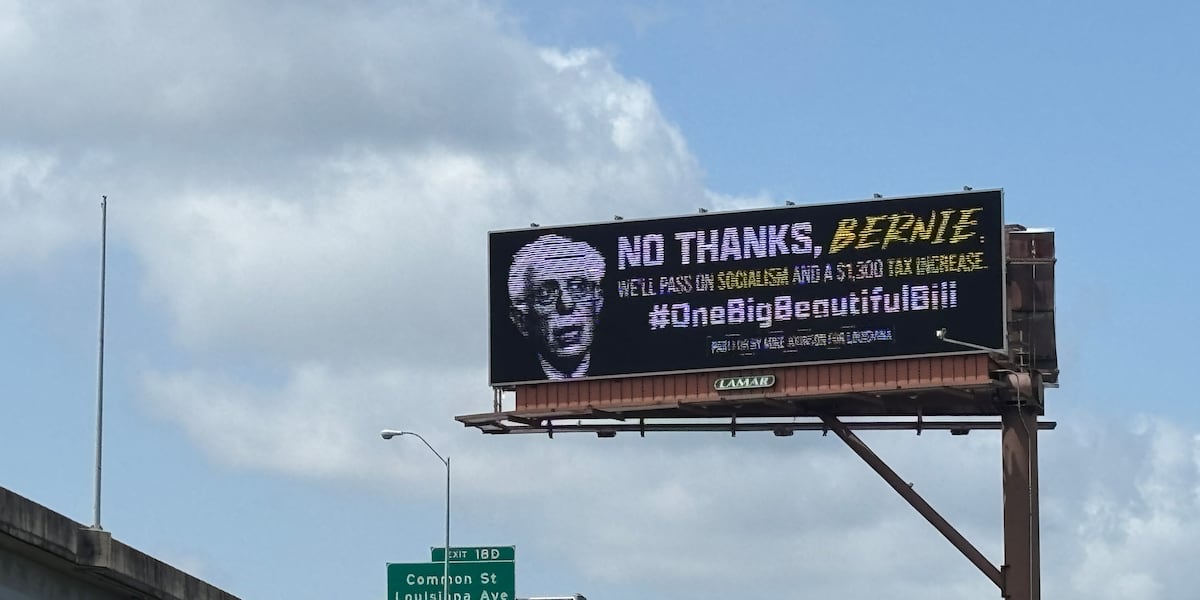The political landscape in Shreveport, Louisiana, is heating up as the ideological battle between conservative Speaker of the House Mike Johnson and progressive Senator Bernie Sanders takes center stage. Ahead of Sanders’ scheduled rally in the city, a billboard funded by Johnson’s team has appeared, sparking a debate about socialism, tax policies, and, perhaps most intriguingly, the concept of oligarchy. This pre-emptive strike highlights the deep divisions within the American political system and provides a localized example of the broader national discourse.
This article delves into the details surrounding the billboard, the reactions it has elicited, and the broader implications of this political maneuver. By examining the context of Sanders’ visit and Johnson’s counter-messaging, we aim to provide a comprehensive understanding of the issues at play and their potential impact on the Shreveport community and beyond. Furthermore, we will explore the definition of oligarchy, its relevance to current political discussions, and why it has become a focal point in this ideological clash.
The Billboard: A Message Against Socialism
The billboard in question, strategically placed along I-20 W, sends a clear message: “No thanks, Bernie. We’ll pass on socialism and a $1,300 tax increase. #OneBigBeautifulBill.” Paid for by Mike Johnson for Louisiana, the billboard serves as a direct counterpoint to Sanders’ policies and aims to resonate with local families concerned about potential tax burdens.
The message explicitly targets what Johnson’s team perceives as the detrimental effects of Sanders’ proposals, particularly the potential financial strain on Louisiana residents. The figure of $1,300 is highlighted to emphasize the purported increase in federal taxes that families might face under Sanders’ policies. This tactic aims to create a tangible sense of concern among voters and sway public opinion against Sanders’ visit and his political agenda.
In essence, the billboard acts as a visual declaration of opposition, framing Sanders’ policies as undesirable for the local community and reinforcing Johnson’s stance against socialist ideologies.
Johnson’s Team Responds: Defending Louisiana’s Interests
KSLA reached out to Johnson’s team for a statement regarding the billboard’s purpose. The response was unequivocal: “As Bernie Sanders arrives in Shreveport, families will be reminded that his policy ideas are disastrous. If he and Democrats in Washington had their way, they would defeat the One Big Beautiful Bill and force the people of our district to pay an average nearly $1,300 more in federal taxes every year.”
The statement further asserts, “That is one of the many reasons Louisiana, like the rest of our nation, will pass on Democrats’ socialism and tax hikes.” This robust defense underscores Johnson’s commitment to safeguarding Louisiana’s economic interests and resisting what he views as harmful socialist policies. By framing the issue as a direct threat to the financial well-being of local families, Johnson’s team seeks to galvanize opposition to Sanders’ visit and reinforce support for conservative principles.
Bernie Sanders’ “Fighting Oligarchy” Tour: A Counter-Narrative
Bernie Sanders’ visit to Shreveport is part of his “Fighting Oligarchy” tour, a campaign aimed at addressing wealth inequality and advocating for policies that empower working-class Americans. The tour stop at the Shreveport Municipal Auditorium on June 21 promises a platform for Sanders to articulate his vision for a more equitable society.
The tour’s focus on oligarchy—a system where power is concentrated in the hands of a few wealthy individuals—directly challenges the existing economic and political structures. Sanders argues that this concentration of power undermines democracy and perpetuates inequality. His visit to Shreveport provides an opportunity to connect with local communities, mobilize support for his policies, and offer an alternative narrative to the conservative messaging promoted by Johnson’s team.
Understanding Oligarchy: Power in the Hands of Few
Oligarchy, at its core, refers to a form of government in which a small number of individuals or entities hold the majority of power. This power can be derived from various sources, including wealth, family ties, military strength, or political influence. Historically, oligarchies have been characterized by limited participation from the general population and a tendency to prioritize the interests of the ruling elite.
In contemporary discussions, the term oligarchy is often used to describe situations where economic power translates into political control. Critics argue that the concentration of wealth in the hands of a few individuals or corporations can distort the democratic process, leading to policies that benefit the wealthy at the expense of the broader public. Sanders’ “Fighting Oligarchy” tour directly addresses this concern, advocating for campaign finance reform, progressive taxation, and policies that level the playing field for all Americans.
Shreveport’s Perspective: Local Impact and National Discourse
The political showdown in Shreveport highlights the broader ideological divisions within the United States. The clash between Johnson’s conservative messaging and Sanders’ progressive vision encapsulates the fundamental differences in approaches to economic policy, social justice, and the role of government. The local community in Shreveport finds itself at the center of this national discourse, with residents weighing the competing arguments and considering the potential impact on their lives.
The billboard and Sanders’ rally serve as catalysts for dialogue and engagement, prompting residents to reflect on their values, priorities, and political affiliations. The outcome of this localized battle may offer insights into the shifting political landscape and the future direction of American politics.
Conclusion: A City at the Crossroads of Ideologies
As Shreveport stands at the crossroads of these competing ideologies, the clash between Mike Johnson and Bernie Sanders underscores the profound divisions shaping American politics. The billboard serves as a stark reminder of the conservative resistance to Sanders’ progressive agenda, while the “Fighting Oligarchy” tour seeks to galvanize support for policies aimed at addressing wealth inequality and empowering working-class Americans.
The outcome of this localized battle will likely reflect the broader sentiments within the community and may offer clues about the future trajectory of American politics. As Shreveport residents engage in these critical discussions, they contribute to the ongoing debate about the role of government, the distribution of wealth, and the meaning of democracy in the 21st century.

Leave a Reply